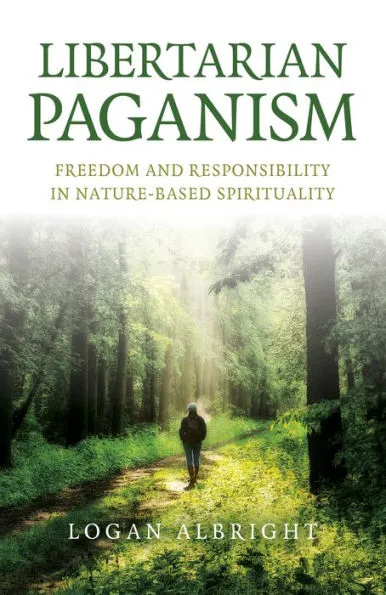In the introduction of "Libertarian Paganism: Freedom and Responsibility in Nature-Based Spirituality," author Logan Albright inoculates himself against some strains of criticism by saying, "I imagine that critics of this book will accuse me of attempting to coopt a spiritual movement and bend it to fit a particular set of political ends. This would be an immensely cynical and dishonest thing to do, and I can certainly understand why such an approach might provoke some extreme reactions. Let me assure the reader, then, that this is not my goal." Well, ok then. That is certainly a thesis I'd noodled on as I read the book, but give the author credit - I would catch myself and recall this soothing phrase. And so, in good faith, I read this book, taking the author's word; where did that leave me?
Mostly in the same place I would have arrived in any case, just with more compassion, A place where I merely disagree with the author and not that there's a con being perpetrated. I found that the "original sin" of the book, so to speak, is that he acknowledges the Western European origin of the pagan practices with which he is familiar and spends time framing the value of certain libertarian ideals in the context of the American Experiment, but doesn't spend much time acknowledging how the differing soil might yield systemic differences. (To his credit, he acknowledges that he knows very little about other indigenous practices across the world and does not claim to speak for them.) Europeans, by and large, look at American ideals of individualism warily; it is often spoken of the same way you often hear Americans speak of communism, e.g., "great idea on paper, never works out in practice." Albright presents numerous definitions of both paganism and libertarianism, which is undoubtedly an intellectually honest way to do things, but it also makes resolving the two philosophies less impossible and more pointless. For example, in the early pages of the book, he demonstrates similarities between the libertarian ideal of non-aggression (which, taken to its logical conclusion, prohibits compelling people from doing anything against their express wishes) and "an ye harm done to do as thou wilt." And, yes, you can negotiate similarities between the two, but anyone who has ever wrestled with "an ye harm none" knows that there are innumerable pitfalls; it's more of a zen koan than a concrete instruction.
This is a book that you can bounce off of if you aren't careful. For example, a chapter titled "Magic and Markets" instantly gave a friend visceral distaste as I described it. And yet, the material within isn't so simple as "how to sell potions and make a killing!" but, in fact, a discussion of how pagans and libertarians think about the material world. The title doesn't help, but it is not nearly as crass as one might guess. In many ways, Albright provides thoughtful analysis of these two precepts in his life. It does you no harm in reading and considering what the author has to say. On the other hand, reading this book without --at least -- additional reading like "The Spiral Dance" is shorting yourself a look at the whole story. Likewise, if you've been wholly steeped in the absolute necessity of collective action, reading "Libertarian Paganism" will at least broaden your horizons.
~review by: Wanderer
Author: Logan Albright
Moon Books, 2023
185 pp., $17.95

